I noticed over the weekend that the highly-regarded Pew Research Center had released the results of public opinion surveys undertaken in a range of advanced countries on various questions around Covid and Covid policy, and that New Zealand was included among the countries surveyed. Some of the results were totally unsurprising, some interesting even if unsurprising, and for a couple of questions I wasn’t quite sure what to make of the questions or answers.
This was the first set of results reported
New Zealand (closely followed by Taiwan) was the country in which the largest share of respondents reckoned that over the full course of the coronavirus outbreak the level of restrictions on public activity were “about right”. Of the remainder of the New Zealand respondents, opinion was fairly evenly split between those who say they’d have favoured fewer restrictions and those who claimed they’d have favoured more. That split was pretty even in Australia too. But I found a few things interesting: first that for all that one’s eye is first taken to the US results – the 26 per cent favouring fewer restrictions – and one thinks of the political polarisation in the US, actually the percentage favouring fewer restrictions was very similar not just in much of continental Europe but in Singapore. I don’t know anything about Greece, but Greek respondents are the only ones where a net balance favoured fewer restrictions over the course of the outbreak.
New Zealand wasn’t in previous surveys, but Pew also reports results for 10 countries where respondents rate their own country’s handling of Covid. The public has become less satisfied, but only in Japan, Spain and (by a narrow margin) France do more people now rate the handling “bad” than “good”. For what it is worth, in the current survey New Zealand respondents give a higher “good” rating to the New Zealand government’s handling than those in other countries, except Singapore.
The next question was about national unity/division
Of course, other things have happened in the last 17 months, and the greater division reported in the US is unlikely to be mostly about Covid itself. More generally I found the range of responses across countries quite surprising, and the New Zealand specific ones surprised me too. It is easy to see that the results are loosely correlated with how bad the Covid experience has been, and perhaps there is nothing more to it than that. But had I been one of those surveyed I’d either have said “not much difference” (it is astonishing how small those numbers are almost everywhere – Japan and Taiwan are exceptions to some extent) or “more divided” (there have been lots of conflicting interests, governments have spent billions and billions of public money, restrictions (still in place) affect some not others, and so on).
As it happens, there is quite a correlation between those who think their country is more divided and those who think the economy is in a bad way (and that gap is quite wide in New Zealand too).
And what of underlying political ideology (not sure whether this is self-identified or derived from answers to other questions)?
In quite a few countries there is no statistically significant difference, but (with Greece and the US as outliers) the responses for New Zealand seem fairly consistent with those for a range of other countries (and not just an anti-government reaction because there is a mix of left and right wing governments in the countries shown).
This was the question that really puzzled me. I simply can’t work out what I’d have answered.
Our economy is doing relatively well at present, but I don’t see that as reflecting anything about the strengths of our “economic system” – more a reflection of the elimination strategy (which caused deep initial losses, and then a bounceback) and of huge and continuing macro policy support, and that is a discretionary policy intervention not a feature of our economic system. And, of course, as you know I’m deeply negative on our economic policy and performance more broadly. That said, it was somewhat interesting that Australians were a bit more optimistic on this question than New Zealanders – and that the Japanese were quite so bleak on their responses.
At least in New Zealand’s case, there is probably some hint of what is going on in these responses. Those who think there should have been fewer restrictions are a lot more likely to answer negatively on the economic recovery, suggesting that those people may be emphasising ongoing border restrictions.
And how do respondents in the various countries say their life has changed as a result of Covid?
New Zealand respondents are mostly likely to say “not too much/not at all” – although a third still answer the other way (presumably some mix of people who would have travelled, people in directly affected industries, those who had hoped to buy a house, and harried public servants in places like the Ministry of Health and DPMC). On days when New World refuses to pack my groceries I might be tempted towards answering that way too. Even in New Zealand and Australia, the young are most likely to say that there has been quite an effect on their lives.
In some countries – but not New Zealand – those who are more pessimistic on the economy are more likely to say their lives have changed.
This was the final chart in the summary report. The New Zealand responses had me spluttering with incomprehension and astonishment.
As it happens, the New Zealand results do not stand out in response to this question, but these answers – globally and for New Zealand – seem like an extreme example of recency biases. Because – with extreme interventions and restrictions – health care systems in advanced countries did not get totally overrun this time, the public is confident that responses to any future pandemic – potentially with quite different characteristics – would also be just fine.
In the New Zealand case, for example, we went into the pandemic with a small number of ICU beds (per capita). It isn’t obvious that much has changed on that front. I’d have had no hesitation in answering “no confidence” on this question, whether for New Zealand or any other advanced country I’ve read about.
Anyway, it was an interesting set of results and nice to have New Zealand included in a consistently-compiled survey. And – as was my goal – I got through the post without offering any hint of my views on what New Zealand governments should be (or have been) doing this year or this week.
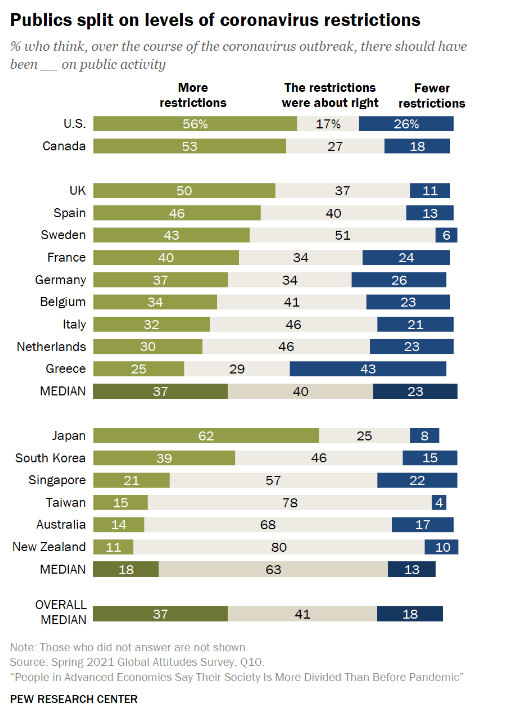
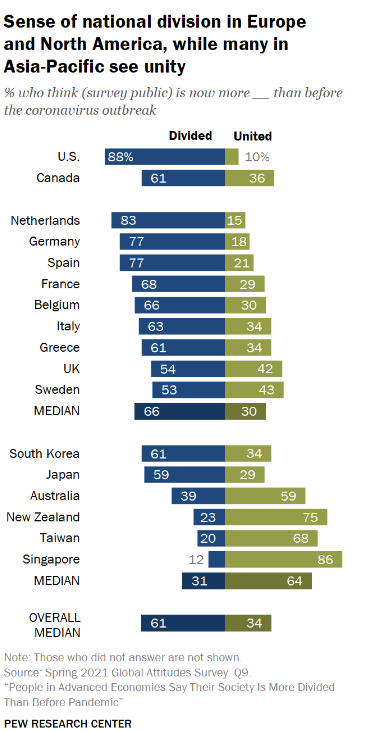

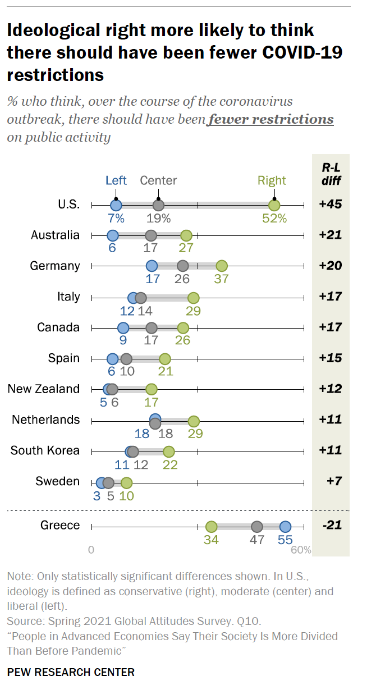
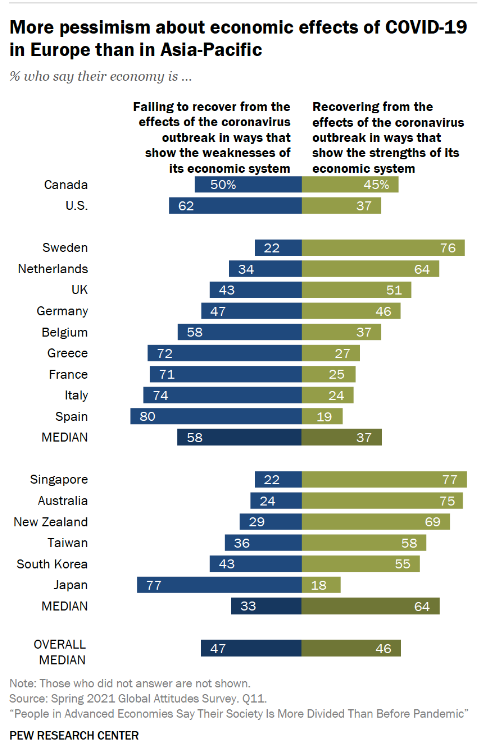
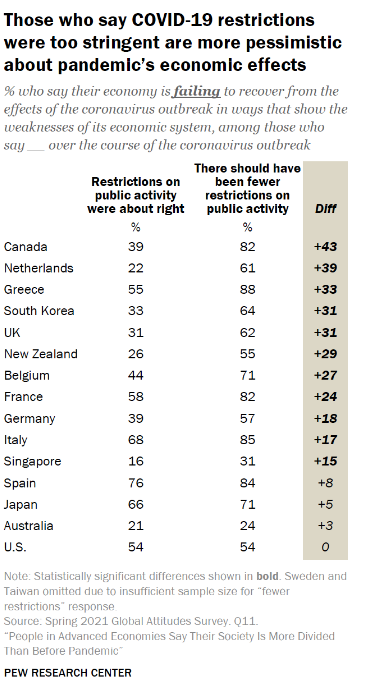
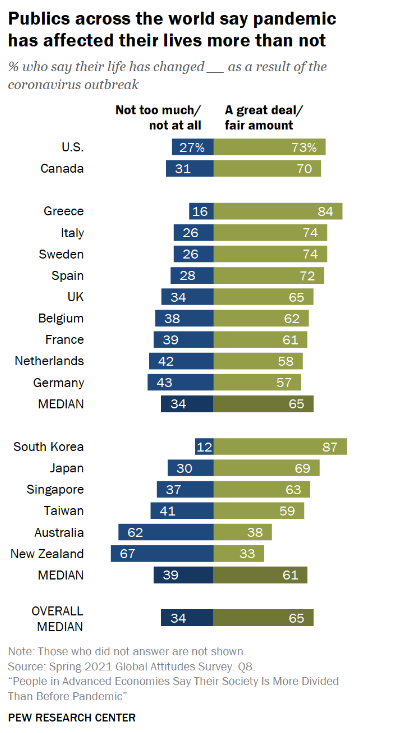
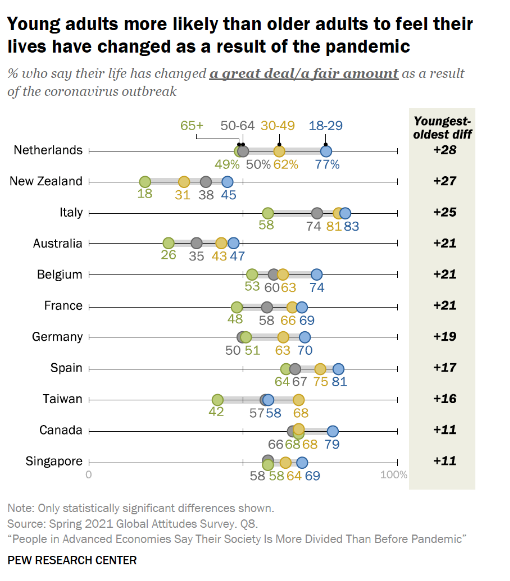
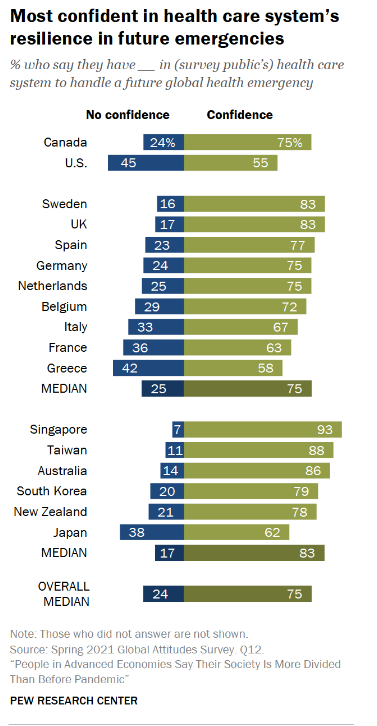
I suspect that globally as more information and analysis becomes available and more widely disseminated opinions will change as already there is some skepticism on stats and weariness of ad hoc lockdowns. The apparent lack of Flu deaths will seem suspicious that Covid is actually a Flu variant. The suppression of Ivermectin and HCL as treatments and the emerging evidence of the unexpected side effects of the “Vaccine” will probably caution some to wait until there is firm evidence on the short & medium term effects of the “Vaccine”. The abject incompetence of the clowns impersonating a govt in NZ seems to have the beneficial side of allowing Kiwis to see the effects above and be more informed, we should also thank the special people for volunteering to be first to test the experimental Covid treatment. I have read that the CDC have been unable to provide the universities who requested samples of the Covid 19 Virus as they do not have samples which poses the question that if the virus has not been isolated how is a vaccine being able to be produced as a cure? I note that in India the use of Ivermectin seems to have been beneficial in terms of Covid deaths compared to states that did nothing and the Indian Bar Association is threatening to sue officials responsible for suppressing Ivermectin for criminal homicide, it would be unsurprising if something similar occurred in the US now that e-mails by Dr Fauci are public and appear to show he was at least very economical with the truth and possibly implicated in the gain of function funding in Wuhan for the Bat Virus.
In NZ we may be hanging on judging by our GDP recovery compared to other other countries and NZ may experience a sudden and unexpected increase in Insolvencies and unemployment and these effects will be ugly economically & socially but I am still happy to be in NZ with no preference to move anywhere else.
LikeLiked by 2 people
Reblogged this on Utopia, you are standing in it!.
LikeLike
My friend is in quarantine in Thailand. His swab test came back in a few hours (not like here). He said people take it seriously there (wearing masks etc). He talked to someone gardening down below and the man told him to put his mask on. It occured to me that compliance may have been fear as much as cohesion?
LikeLike
Given that in Thailand, you can pay a few extra dollars to expediate anything I seriously doubt the accuracy of the tests. That is probably why face masks are a necessity when tests in Thailand may not be taken seriously. In NZ our version of corruption is to slow everything down and to treble check everything. More money in more redundant cross checking.
LikeLike
In respect of “the question that really puzzled me. I simply can’t work out what I’d have answered”, the problem is evident – it is a double-barrelled question. An important principle of survey design is that each question should address only one issue.
The subordinate clause of this question is a dead giveaway that it raises two separate issues: is the economy recovering from the coronavirus, and does that show the strength of the economic system. Because these are distinct, there are four possible answers (Yes/Yes, Yes/No, No/Yes, No/No), not two.
Pew is usually more competent than this.
LikeLiked by 1 person